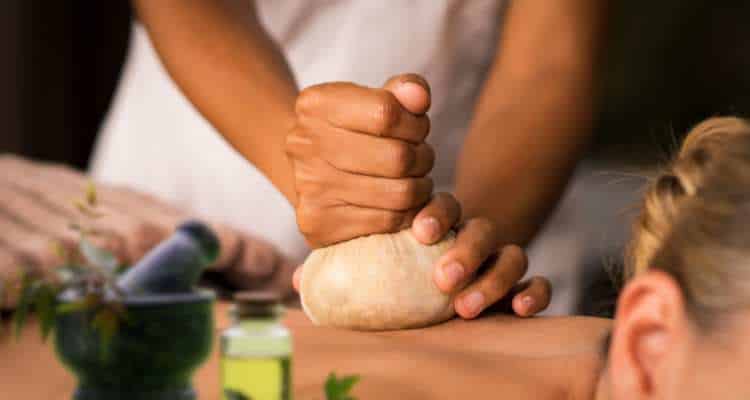Ayurvedic Treatment for Frozen Shoulder in Coimbatore
Best Ayurvedic Treatment for Frozen Shoulder in Coimbatore
Ayurvedic Treatment for Frozen shoulder involves a combination of internal medications and external as well as panchakarma therapies that provides a comprehensive and effective approach to its management. At Avnika Ayurvedic, we offer personalised therapies, yoga and exercises, dietary, and lifestyle guidance to support your journey toward better recovery from frozen shoulder.

Pure Herbal

Evidence Based

Guranteed Results
Book An Ayurvedic Treatment for Frozen Shoulder in Coimbatore.
If you are looking for an Ayurvedic Treatment for Frozen Shoulder in Coimbatre Book an appointment and get free consultation.
Aim of Avanika's Ayurvedic Treatment Package for Frozen Shoulder
The primary aim of our Ayurvedic treatment for frozen shoulder at Avanika Ayurvedic is:
- Effective Pain Management: To significantly reduce the persistent pain and discomfort associated with frozen shoulders.
- Enhanced Mobility: To progressively improve the range of motion and flexibility of the affected shoulder joint.
- Inflammation Reduction: To address and alleviate the underlying inflammation within the shoulder capsule.
- Functional Restoration: To enable you to perform daily activities with ease and without restriction.
- Long-Term Relief: To provide sustainable relief and prevent future recurrence through holistic healing.

Benefits of Avanika's Ayurvedic Treatment Package for Frozen Shoulder
- Personalised Ayurvedic treatment plans tailored to individual needs
- Expert guidance from experienced Ayurvedic practitioners
- Supports pain relief and reduces stiffness
- Aids in improving joint mobility and flexibility
- Addresses underlying imbalances in doshas
- Strengthens muscles and ligaments surrounding the shoulder joint
- High-quality herbal formulations and therapies
- Holistic care that integrates lifestyle, diet, and physical therapy

What is Frozen Shoulder?
Frozen shoulder, technically adhesive capsulitis is a capsular inflammation leading to adhesion, later leading to fibrosis, creating restriction of movement.
It is a debilitating condition that restricts shoulder movement and causes persistent pain. The stiffness and immobility associated with this condition significantly impact daily activities, making even simple tasks like combing hair or wearing clothes challenging. The early stage of this disease is marked by tenderness and stress pain which later becomes painless restriction.
Types
- Primary Frozen Shoulder – without a preceding event
- Secondary Frozen Shoulder – Caused due to trauma and immobilization, endocrine (eg. Diabetes), neurological disorders, malignancy etc. There is significant and progressive restriction of active and passive range of motion.
Three stages of primary Frozen Shoulder
Stage 1 freezing – up to 9 months – gradual onset of diffuse shoulder pain
Stage 2 frozen 4-20 months – progressive loss of ROM
Stage 3 – thawing – 5-26 months a period of progressive improvement.
What are the symptoms of Frozen Shoulder?
- Vague, dull pain that aggravates with movement
- Nagging pain at night that disturbs the sleep is a hallmark symptom and can significantly disrupt sleep patterns.
- Inability to sleep comfortably on the affected side
- Difficulty lifting the arm away from the body (abduction), rotating the arm outwards (external rotation), and rotating the arm inwards (internal rotation). These restrictions are present in both active and passive movements.
- The pain typically develops gradually over time.
- The stiffness and limitation in movement worsen progressively.
- In the frozen stage, the shoulder can become severely restricted, making even simple movements very challenging.
- Even when not actively moving the shoulder, a dull ache may persist.
Lifting the arm overhead becomes increasingly difficult and painful
What are the causes ?
- Capsular Inflammation & Adhesion Formation: Inflammation of the shoulder capsule leads to fibrosis, restricting movement.
- Rotator Cuff Lesion: Supraspinatus tendinitis progressing to a rotator cuff tear.
- Impingement Syndrome: Involves the rotator cuff and subacromial bursa.
- Bicipital Tendonitis: Inflammation of the biceps tendon.
- Underlying Medical Conditions: Diabetes, thyroid disorders, cardiovascular diseases like Myocardial infarction, hemiplegia, Parkinson’s disease, and post-surgical immobilization can contribute to the condition.
Risk factors
- Middle-aged individuals (40–60 years) are more susceptible.
- More common in women than men.
- People with a history of shoulder injury or surgery.
- Individuals with diabetes, thyroid disorders, or cardiovascular diseases.
- Those with prolonged shoulder immobilization due to fractures or surgery.
- Neurological conditions like Parkinson’s disease.
Ayurvedic Perspective
In Ayurveda, frozen shoulders are linked to an imbalance in Vata Dosha, which governs movement and flexibility. However, Kapha Dosha imbalance can also contribute by causing swelling and stiffness. It is a condition affecting the tendons and ligaments leading to stiffness of the joints. The condition is referred to as apabahuka, likened to the rigid, stiff-like arm posture seen in those affected by severe pain and limited mobility.
Ayurvedic treatment for Frozen Shoulder in Coimbatore
Herbal Medicines and Formulations
- First Stage (Active Inflammation):
- Rasnasaptakam Kashayam – Reduces inflammation and stiffness
- Guggulu Combinations:
- Amruta Guggulu / Kaisora Guggulu (for Pitta predominance)
- Kanchanara Guggulu (for Kapha predominance)
- Trayodasanga Guggulu (overall joint support)
- Vatagajankusha Rasam – Effective in advanced frozen shoulder cases
- Second and Third Stages (Adhesion & Stiffness):
- Guggulutiktakam Kashayam – Addresses joint degeneration
- Sahacharadi Kashayam + Avarti/Gandhatailam – Supports range of motion
- Prasaranyadi Kashayam – Effective in restoring mobility when no ama (toxins) is present
- Ksheerabala Taila & Dhanwantaram Taila – Strengthens and nourishes tissues
External Applications & Therapies
External therapies play a crucial role in managing pain, reducing inflammation, and improving mobility:
- Taila Abhyanga (Therapeutic Oil Massage): Gentle yet effective massage with specific medicated oils helps to improve blood circulation, relax muscles, reduce pain and stiffness, and nourish the tissues. We select oils based on your dosha and condition:
- Murivenna, Kottamchukkadi Taila, Chinchadi Taila, Prabhanjanam Kuzhambu: These oils are traditionally used for musculoskeletal pain and inflammation.
- Jambeera Taila: May be used when Pitta-related inflammation is prominent.
- Prabhanjana Vimardanam: A specific type of deep tissue massage using warm medicated oils to relieve deep-seated stiffness and pain.
- Sahacharadi Tailam (External Application): Applied externally to improve blood circulation and reduce pain.
- Swedana (Sudation Therapy): Medicated steam therapy helps to loosen stiff joints, improve circulation, and relieve pain. We utilize various types of Sweda:
- Patra Pinda Sweda (Herbal Poultice Therapy): Warm poultices made with specific medicinal leaves like Nirgundi, Eranda, and Rasna are applied to the affected area to enhance circulation and alleviate pain.
- Valuka Sweda (Sand Pouch Therapy): Warm sand-filled pouches are used to provide localized dry heat, which can help to break down adhesions and reduce stiffness.
- Nadi Sweda (Steam Therapy): Localized steam is directed to the affected shoulder to improve joint lubrication and mobility.
- Lepana (Herbal Paste Application): Application of medicinal herbal pastes:
- Grihadhoomadi Lepa: May be used in the first stage to reduce inflammation.
- Parisheka (Medicated Liquid Pouring): Warm medicated liquids are continuously poured over the affected area:
- Dhanyamala Dhara: Fermented herbal liquid pouring to reduce inflammation and pain.
- Dhara (Continuous Stream of Medicated Liquid): A continuous stream of warm medicated oil is poured over the affected area for a specific duration:
- Karpasasthyadi Taila/Kottamchukkadi Taila Dhara: These oils are beneficial for pain relief and reducing stiffness.
Panchakarma Therapies
- Vasti (Enema Therapy): Ksheeravasti and Anuvasana Vasti help pacify aggravated Vata and restore lubrication to joints.
- Nasya Therapy: Instillation of medicated oils like Anu Taila/Ksheerabala taila to reduce pain and stiffness. Nasya for the long term can help achieve better outcomes along with daily exercises.
- Raktamokshana (Bloodletting Therapy): Beneficial in cases where inflammation is dominant.
Lifestyle Recommendations forFrozen Shoulder
Along with specific therapies, we provide personalized lifestyle recommendations to support your healing process:
- Avoid sleeping on the affected side: This can put unnecessary pressure on the shoulder joint.
- Prevent exposure to direct AC or fans: Cold air can aggravate pain and stiffness.
- Use proper pillow support: Ensure your neck and shoulder are adequately supported during sleep.
- Avoid head baths at Noon: This can sometimes aggravate the doshas and cause Myofascial pain syndrome.
- Refrain from consuming heavy, cold, and processed foods at night: These can disrupt digestion and potentially aggravate doshic imbalances.
- Daily Nasya: Practicing nasya with anu taila (instillation of medicines into the nose) helps control frozen shoulder
- Blood Sugar Control: Maintaining healthy blood sugar levels can help prevent the progress of this disease
Diet During Ayurvedic Treatment for Frozen Shoulder
A balanced and nourishing diet plays a vital role in recovery:
- Include warm, easily digestible foods: This helps to maintain optimal digestion and assimilation of nutrients.
- Consume ghee (clarified butter), sesame oil, and herbal decoctions: These help to lubricate the joints and reduce dryness associated with Vata.
- Avoid excessively dry, cold, or heavy-to-digest foods: These can aggravate Vata and Kapha.
- Drink warm herbal teas: Teas made with Ginger, Dashmool, and Rasna can help to reduce inflammation and pain.
How to Prevent Frozen Shoulder in Natural Way?
Regular exercises can help prevent frozen shoulder and restore flexibility.
- Exercise: Regular exercises can help prevent frozen shoulder and restore flexibility.
- Pendulum Stretch: Bring the arm to a hanging position and gently swing it in circles.
- Wall Walking: Use fingers to walk the hand up and down a wall.
- Cross-Body Arm Stretch: Bring the affected arm across the chest and hold for a few seconds.
- Arm Circles: Improve blood circulation and mobility.
- Armpit Stretches: Stretch the shoulder and chest muscles.
- Shoulder Flexion: Lift the arm overhead with assistance.
- Towel Stretch: Hold a towel behind the back with both hands and gently stretch.
- Avoid sleeping directly on the affected side: This avoids putting undue pressure on the healing joint.
- Avoid direct exposure to air conditioning or fans: Cold temperatures can aggravate stiffness and pain, especially in individuals with Vata predominance.
- Maintain proper pillow support: Ensure your neck and shoulders are aligned correctly during sleep to prevent strain.
- Avoid taking head baths at noon: Ayurveda suggests that head baths during the hottest part of the day can lead to inflammatory changes in the body.
Avoid consuming heavy, cold, and processed foods late at night: These can impair digestion and potentially exacerbate Vata imbalances
What are you waiting for...
Book an Appointment
Hours & Contact
28A Bharathi Park 7th Cross, Saibaba Colony, Coimbatore
641043
+9142229 69555
+9189039 69555
info@avanikaayurvedic.com
Open All Days 7:00 AM -7:00 PM
